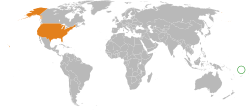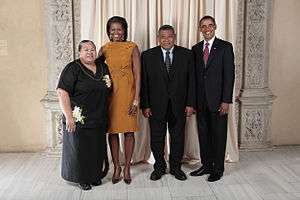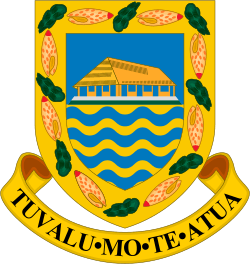Tuvalu–United States relations
Tuvalu – United States relations are bilateral relations between Tuvalu and the United States.
 | |
Tuvalu |
United States |
|---|---|
History
There was limited interaction between U.S. citizens and the Tuvaluan people in the 19th century. American whaling ships were active in the waters of the Tuvaluan archipelago. In 1821 Captain George Barrett, of the Nantucket whaler Independence II, visited Niulakita, which he named Rocky (Group).[1] This name was never much used, but Independence Island, after Barrett's ship, was one of the several names which came into general use for Niulakita during the 19th century.[1]
The United States Exploring Expedition under Lieutenant Charles Wilkes visited Funafuti, Nukufetau and Vaitupu in 1841.[2] During the visit of the expedition to Tuvalu Alfred Thomas Agate, engraver and illustrator, recorded the dress and tattoo patterns of men of Nukufetau.[3]
On 15 April 1889 Niulakita was sold for $1,000 to Mr H. J. Moors, an American citizen living in Apia, Samoa.[4] Niulakita and other islands of the Tuvaluan archipelago were claimed by the United States under the Guano Islands Act (1856), which was passed by the U.S. Congress to enable citizens of the U.S. to take possession of islands containing guano deposits. In the 1840s guano was a source of saltpeter for gunpowder as well as an agricultural fertilizer. The legislation was enacted to assist in securing supplies of guano.
On 4 August 1892 Captain Davis of HMS Royalist visited Niulakita but did not land on the island, he recorded in the ship's journal: “Several natives appeared on the beach, and hoisted up an American ensign.”[5]
On 16 September 1896 Captain Gibson of HMS Curacoa, recorded in the ship's journal that six men and six women, natives of various islands, were living on Niulakita working for Moors. Captain Gibson determined that the island was not under American protection so he hoisted the Union Jack and delivered the flag, with a copy of the Declaration of British Protectorate, to the headman of the working party.[4][6] Moors later abandoned Niulakita when the deposits of guano were depleted.
In 1900 USFC Albatross visited Funafuti when the United States Fish Commission were investigating the formation of coral reefs on Pacific atolls.[7] Harry Clifford Fassett, captain's clerk and photographer, recorded people, communities and scenes at Funafuti.
During the Pacific War (World War 2) Funafuti was used as a base to prepare for the subsequent seaborn attacks on the Gilbert Islands (Kiribati) that were occupied by Japanese forces.[8] The United States Marine Corps landed on Funafuti on 2 October 1942[9] and on Nanumea and Nukufetau in August 1943. The Japanese had already occupied Tarawa and other islands in what is now Kiribati, but were delayed by the losses at the Battle of the Coral Sea. The atolls of Tuvalu acted as a staging post during the preparation for the Battle of Tarawa and the Battle of Makin that commenced on 20 November 1943, which was the implementation of "Operation Galvanic".[10]
Following Tuvalu becoming an independent nation in 1978, relations with the United States were confirmed by the signing of a Treaty of Friendship in 1979, which was ratified by the U.S. Senate in 1983, under which the United States renounced prior territorial claims to four Tuvaluan islands (Funafuti, Nukufetau, Nukulaelae and Niulakita) under the Guano Islands Act of 1856.[11]
Management of tuna fishing in the western Pacific
Tuvalu participates in the operations of the Pacific Island Forum Fisheries Agency (FFA)[12] and the Western and Central Pacific Fisheries Commission (WCPFC).[13] The Tuvaluan government, the US government, and the governments of other Pacific islands, are parties to the South Pacific Tuna Treaty (SPTT), which entered into force in 1988.[14] Tuvalu is also a member of the Nauru Agreement which addresses the management of tuna purse seine fishing in the tropical western Pacific. In May 2013 representatives from the United States and the Pacific Islands countries agreed to sign interim arrangement documents to extend the Multilateral Fisheries Treaty (which encompasses the South Pacific Tuna Treaty) to confirm access to the fisheries in the Western and Central Pacific for US tuna boats for 18 months.[15][16] Tuvalu and the other members of the Pacific Island Forum Fisheries Agency (FFA) and the United States have settled a tuna fishing deal for 2015; a longer term deal will be negotiated.[17] The treaty is an extension of the Nauru Agreement and provides for US flagged purse seine vessels to fish 8,300 days in the region in return for a payment of US$90 million made up by tuna fishing industry and US-Government contributions.[18]
Differences in positions on climate change
.jpg)
There have been disagreements between the two countries over the issues of climate change and the Kyoto Protocol. The main point of friction between Tuvalu and the United States has been the latter's non-ratification of the Kyoto Protocol.
The impact of global warming in Tuvalu has been a concern of the government of Tuvalu. Following the Kyoto Protocol, Tuvalu repeatedly urged the United States to do more to reduce its pollution levels. In 2002, Tuvaluan Prime Minister Koloa Talake threatened to take the United States to the International Court of Justice for its refusal to ratify the Kyoto Protocol.[19] He was prevented from doing so by his subsequent defeat in that year's general election.
More recently, under the administration of President Barack Obama, the United States has acknowledged the effects of climate change on the Pacific Small Island Developing States (PSIDS). Prime Minister Enele Sopoaga said at the 2015 United Nations Climate Change Conference (COP21 in December 2015) that the goal for COP21 should a global temperature goal of below 1.5 degrees Celsius relative to pre-industrial levels, which is the position of the Alliance of Small Island States.[20]
The leadership of President Obama in achieving the outcome of COP21,[21] resulted in the participating countries agreeing to reduce their carbon output "as soon as possible" and to do their best to keep global warming "to well below 2 degrees C",[22] results in a closer alignment in the climate change policies of the two countries. Prime Minister Enele Sopoaga described the important outcomes of COP21 as including the stand-alone provision for assistance to small island states and some of the least developed countries for loss and damage resulting from climate change and the ambition of limiting temperature rise to 1.5 degrees by the end of the century.[23]
Consistent position on human rights practices

Tuvalu supports American positions on issues related to human rights. Tuvalu participates in the preparation of reports prepared by the U.S. Department of State entitled "Country Reports on Human Rights Practices",[24] which are submitted to the U.S Congress by the Department of State in compliance with the Foreign Assistance Act of 1961 (FAA) and section 504 of the Trade Act of 1974.[25]
Tuvalu is recognised as one of the Small Island Developing States (SIDS) and participates in the activities of the Alliance of Small Island States (AOSIS) and from this perspective Tuvalu lobbies to achieve development goals that in international forums may be opposed by the United States. There are many aspects of social and political policy on which Tuvalu maintains a position that is consistent with that of the United States. On 29 September 2013 the Deputy Prime Minister Vete Sakaio stated in his speech to the General Debate of the 68th Session of the United Nations General Assembly, that Tuvalu, maintains a commitment to “multilateralism and genuine collective action to reflect, assess, address and plan ahead our Chartered principles of peace, justice, human rights and social progress, and equal opportunity for all.”[26]
Tuvalu's relations with Cuba
Tuvalu recognises the government of Cuba and the government of Tuvalu has, since 2008, stated a desire for the U.S. to review its relationship with Cuba.[27] The Deputy Prime Minister Vete Sakaio stated in his 2013 speech to the U.N. that “Tuvalu also fully supports the lifting of the embargos against Cuba. This will allow the Republic of Cuba to further consolidate and enhance its cooporation with Small Islands Developing States like Tuvalu.”[26]
Diplomatic missions
Neither country has a resident ambassador. The United States ambassador to Fiji is accredited to Tuvalu. Tuvalu maintains a diplomatic presence in the United States through its Permanent Mission to the United Nations, in New York City;[28] it is headed by Samuelu Laloniu (since 21 July 2017).[29]
See also
- Foreign relations of Tuvalu
- Foreign relations of the United States
- United States Ambassador to Tuvalu
References
- Keith S. Chambers & Doug Munro, The Mystery of Gran Cocal: European Discovery and Mis-Discovery in Tuvalu, 89(2) (1980) The Journal of the Polynesian Society, 167-198
- Tyler, David B. – 1968 The Wilkes Expedition. The First United States Exploring Expedition (1838–42). Philadelphia: American Philosophical Society
- Wilkes, Charles. "Ellice's and Kingsmill's Group". The First United States Exploring Expedition (1838–42) Smithsonian Institution. p. Vol. 5, Ch. 2 pp. 35–75.
- Roberts, R.G. (1958). Te Atu Tuvalu: A short history of the Ellice Islands. 67 (4) Journal of the Polynesian Society. pp. 196–197.
- Resture, Jane. "TUVALU HISTORY - Davis Diaries (H.M.S. Royalist, 1892 visit to Ellice Islands under Captain Davis)". Retrieved 20 September 2011.
- Laracy, Hugh (ed.) (1983). "The 'Ownership' of Niulakita, 1880-1896". Tuvalu: A History. Institute of Pacific Studies, University of the South Pacific and Government of Tuvalu. pp. 196–197.CS1 maint: extra text: authors list (link)
- "National Archives & Records Administration". Records of the United States Fish and Wildlife Service, U.S. Retrieved 20 September 2011.
- McQuarrie, Peter (1994). Strategic atolls: Tuvalu and the Second World War. Macmillan Brown Centre for Pacific Studies, University of Canterbury/ Institute of Pacific Studies, University of the South Pacific. ISBN 0958330050.
- "Tuvalu (Ellice Islands)". Retrieved 1 June 2012.
- "To the Central Pacific and Tarawa, August 1943—Background to GALVANIC (Ch 16, p. 622)". 1969. Retrieved 3 September 2010.
- "DOI Office of Insular Affairs (OIA) – FORMERLY DISPUTED ISLANDS". Doi.gov. Archived from the original on 2007-09-30. Retrieved 13 October 2017.
- "Pacific Island Forum Fisheries Agency". Retrieved 11 October 2010.
- "The Western and Central Pacific Fisheries Commission (WCPFC)". Retrieved 29 March 2012.
- "South Pacific Tuna Treaty (SPTT)". 1988. Retrieved 1 September 2010.
- "United States and Pacific Islands Strengthen Fisheries Cooperation". US Embassy – Papua New Guinea. 10 May 2013. Archived from the original on 21 September 2013. Retrieved 3 September 2013.
- Coutts, Geraldine (16 May 2013). "US signs new tuna agreement with the Pacific". Radio Australia. Retrieved 3 September 2013.
- "US, Pacific Islands To Negotiate Tuna Treaty In Brisbane". Pacific Islands Report - PIDP, East-West Center. 29 July 2015. Retrieved 31 July 2015.
- "Pacific Islands and US settle tuna deal". FIS Australia. 9 October 2014. Retrieved 18 October 2014.
- "Talake, Luka Tussle For PM In Island Nation Polls" Archived 2008-10-10 at the Wayback Machine, Samisoni Pareti, Pacific Magazine, August 1, 2002
- Sims, Alexandra (2 December 2015). "Pacific Island Tuvalu calls for 1.5 degrees global warming limit or faces 'total demise'". The Independent. Retrieved 5 December 2015.
- "U.S. Leadership and the Historic Paris Agreement to Combat Climate Change". The White House - Office of the Press Secretary. 12 December 2015. Retrieved 4 January 2016.
- "Adoption of the Paris agreement—Proposal by the President—Draft decision -/CP.21" (PDF). UNFCCC. 2015-12-12. Archived (PDF) from the original on 2015-12-12. Retrieved 2015-12-12.
- "Tuvalu PM praises COP 21 agreement". Radio New Zealand International. 16 December 2015. Retrieved 16 December 2015.
- "Country Reports on Human Rights Practices - East Asia and the Pacific". U.S. State Department. 28 September 2013. Retrieved 15 May 2014.
- "2013 Country Reports on Human Rights Practices (Tuvalu)". U.S. State Department. Retrieved 10 March 2014.
- "Statement Presented by Deputy Prime Minister Honourable Vete Palakua Sakaio". 68th Session of the United Nations General Assembly - General Debate. 28 September 2013. Retrieved 4 November 2013.
- "Cuba-Pacific ministerial meeting underway in Havana", ABC Radio Australia, 17 September 2008
- US Department of State
- "The World Factbook (CIA)". 2017. Retrieved 20 October 2018.
External links
- History of Tuvalu - U.S. relations
- Official website of the United States embassy in Fiji. The US ambassador to Fiji is accredited to Tuvalu.
- Address of the Permanent Mission of Tuvalu to the United Nations, Tuvalu's only diplomatic presence in the United States.
